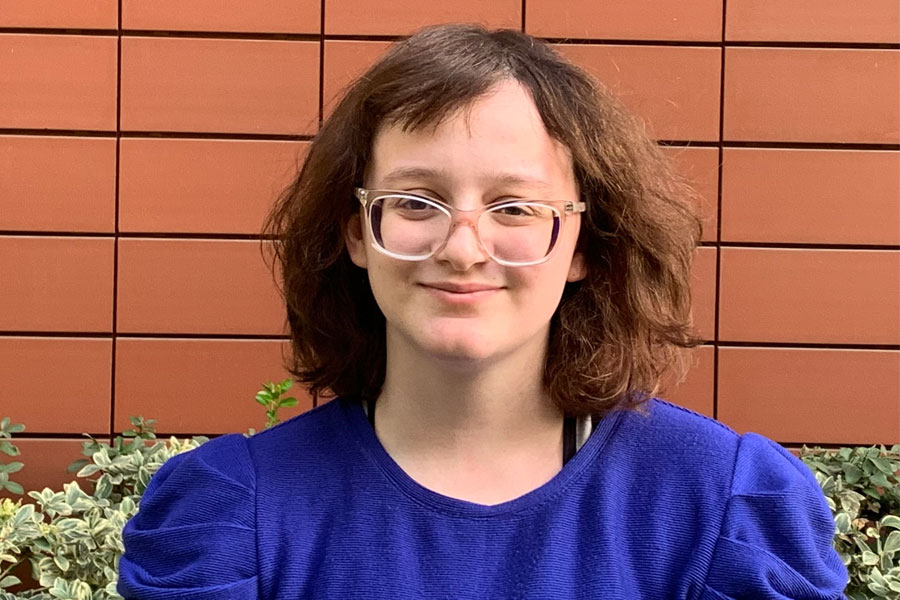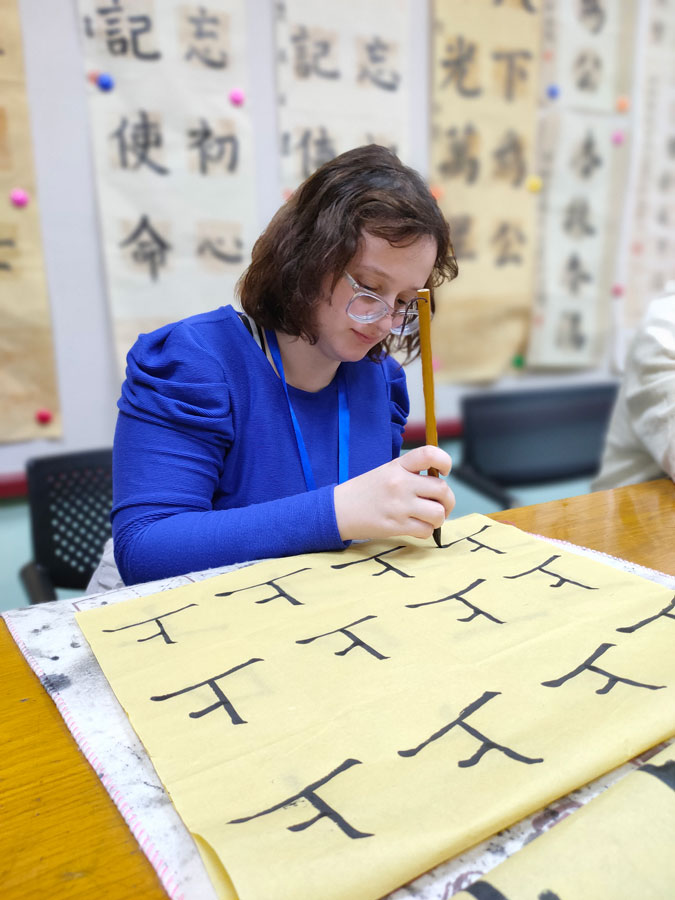Transforming Your Perspective

Name: Savannah Glaves
Home Country: United States
Degree: Masters in International Studies
Scholarship: Hassenfeld Fellowship
Tell us about your background and how you became interested in China.
Starting out, I was actually more interested in Korea before pivoting to China. Around high school I decided that I was going to major in Korean during my undergrad, but I also felt like knowing Chinese would help more with job prospects, especially since many more people speak Chinese and because China has a more significant place in the world economy and politics. Therefore, I decided to study Chinese as well. During the 2021-2022 academic year, I studied in Taiwan for 11 months and started to feel a strong connection to Chinese culture and people. Due to my original interests in Korean popular culture and its soft power influence on other nations, I started to think about mainland Chinese and Taiwanese popular culture and if they had any influence on other nations through their popular culture. During my last few months in Taiwan, I conversed with my thesis advisor back at the University of Kansas and decided for my undergraduate thesis to focus on how mainland Chinese television and film did or did not influence Taiwanese attitudes toward reunification with the mainland.Don’t be afraid to step out of your comfort zone...now that I’m here, I can say that I did make the right decision.
What led you to the Hopkins-Nanjing Center? What made you choose the HNC?
One of the major things that led me to the Hopkins-Nanjing Center was the Chinese immersion. While in Taiwan, I was enrolled at the International Chinese Language Program (ICLP) at National Taiwan University. ICLP had a language pledge that required us to speak in Chinese every day that we were in the building, and I wanted to have something similar to that in my masters program. While the HNC does not have a language pledge, it has a similar structure in that we are expected to speak in Chinese in our classes (unless you’re taking a class in English, that is), and we often speak in Chinese to explain certain English words to our Chinese classmates. Being in a 2-year program here will significantly help in improving my Chinese language skills, and it was the biggest reason I chose to go the HNC.Do you have any tips for future students adjusting to Chinese coursework?
I feel like the first week or two of classes is the hardest for adjusting to Chinese coursework. I felt like I was looking up a lot of words for my statistics class the first week which added on several hours to what would have been a short reading. However, after the second or third week, the words started repeating, and I felt like I didn’t have to look as much up. You also learn how to pace yourself after the first few weeks, especially since you already know what your classes are and have more time to prepare. I would recommend any student coming to the HNC to learn to start skipping words unless it seems essential to understanding the meaning of the sentence. For my class Film, Culture, and Society in Contemporary China, there are a lot of words that I don’t know the meaning to, but I skip them and can finish a page in around 10-15 minutes. If I didn’t skip the words, I could probably take upwards to an hour trying to finish one page.What has been one of your favorite experiences at the Hopkins-Nanjing Center so far?
One my favorite experiences so far has been participating in student-led activities in the student activity center. Many of the students meet up here to participate in various interest groups, such as mahjong, Dungeons and Dragons, trivia, etc. Some students also host get-togethers to watch movies or play board games. I really like to put together puzzles, and the other day I bought a few 1,000-piece puzzles and asked if anyone wanted to do them together. Around 10 of us met up one night in the student activity center to put together the puzzle, and we completed one in about 2 hours! We all complained about how hard it was in the beginning and that we likely weren’t going to finish it by the end of the night, but by the end we were all excited to have finished the puzzle before bedtime. I felt like it was a good opportunity to converse with other students and create a sense of community.What experiences during your time at the HNC have transformed your perspective or way of thinking?
I’ve only been at the HNC for a few weeks now, but I feel like communicating with the other students has given me more of an idea that people have very diverse perspectives because of where we grew up. It seems more prominent to me than in my undergraduate university, particularly because the vast majority of students were American, although we did have some foreign students scattered throughout. I’m often learning about how Chinese people think about certain global issues, which may not always coincide with what I think about the issue. My MAIS tutorial class specifically highlights these differences as well, since we often look at different theories from a Chinese point of view and an American one. I feel like by the end of my program, I will be able to look at issues from a more open-minded perspective due to this constant interaction with people and readings that have a different perspective than my own.What is your favorite thing about Nanjing?
My favorite thing so far about Nanjing is probably the large number of cafes near the school. I don’t personally drink coffee, but they normally have assortments of tea that are (in my opinion) better than teas from cafes in the U.S. There’s a cafe that’s really close to the HNC that sells books and also has an art studio. It’s a great spot for studying and to maybe have a little snack, but I also want to try going there sometime when I’m free from classwork to try out painting in their art studio. Overall, I want to explore more of Nanjing in the future to find new cafes to enjoy.
Whose support has made your journey at the HNC possible?
My parents and sister have supported me through all of my undergraduate and now graduate career. Even though my mother is always extremely worried when I go abroad—especially now with me being in China—she has always told me that she supports me even if it’s not exactly what she wants me to do. My aunts, uncles, cousins, and grandparents also have supported my endeavors in South Korea, Taiwan, and now China. I don’t think I would have felt as free to pursue degrees in East Asian Languages & Cultures and Global & International Studies when I was in my undergraduate career without their support, which means I wouldn’t be pursuing a Master of Arts in International Studies now at the HNC. I’d just like to thank all of them for their support, and I hope to make all of them proud in the future.If you could give one piece of advice to future HNC students, what would that be?
Don’t be afraid to step out of your comfort zone. When I was first accepted to the HNC, I was ecstatic that I was going to be able to study in China, especially after the country being closed for the past 3-4 years. However, as the date came closer to my departure, the idea of being in another country for two years seemed extremely daunting and made me question my decision of pursuing graduate school. However, now that I’m here, I can say that I did make the right decision—although back in August I probably would have doubted that. If you think you should do something and then change your mind due to fears, try to push past that and you likely won’t regret it!If you are looking to learn more about what it's like to be a current student at Johns Hopkins SAIS, we encourage you to schedule a virtual appointment with one of our Admissions Fellows.
Enjoyed reading Savannah's experience? Learn more about our Master of Arts in International Studies.
Back to Student Stories